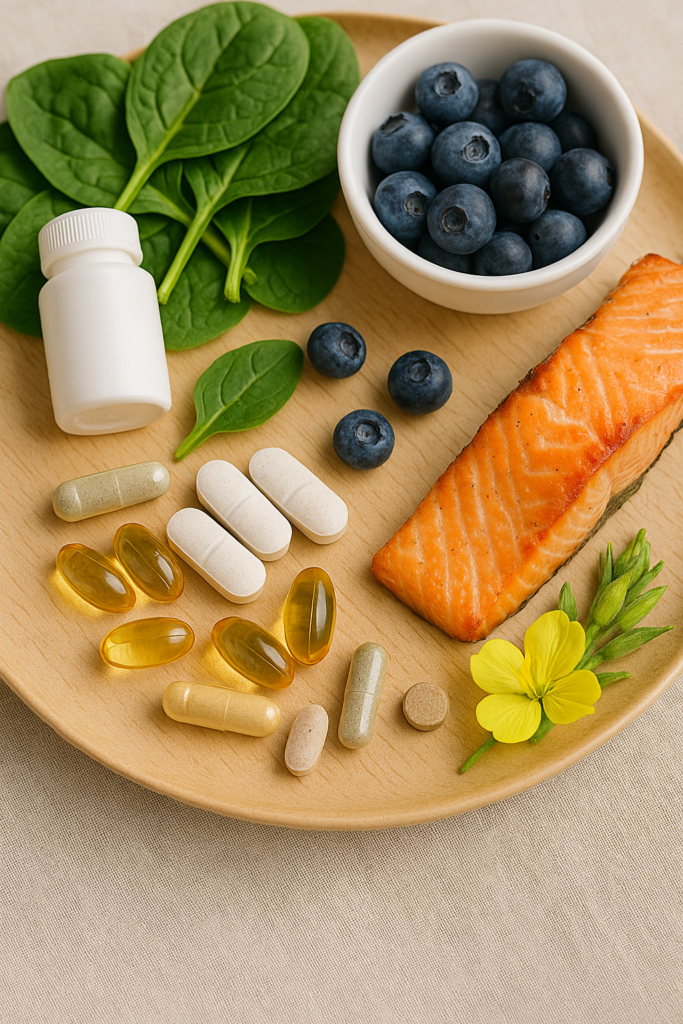Perimenopause — the transition years leading up to menopause — can bring a wave of changes. Hot flashes, night sweats, mood swings, sleep disruptions, brain fog, and shifts in metabolism are all common as hormones fluctuate. At the same time, long-term health concerns like bone density and cardiovascular health come into focus.
Food and lifestyle are always the foundation, but the right supplements can help smooth the transition and ease symptoms. Here are the top 10 supplements I recommend women consider during perimenopause — always with the guidance of a qualified healthcare provider.
1. Calcium + Vitamin D3 + Vitamin K2
- Why: Estrogen decline accelerates bone loss and raises cardiovascular risk.
- What it does:
- Calcium strengthens bones.
- Vitamin D3 helps absorb calcium and supports mood and immunity.
- Vitamin K2 directs calcium into bones and away from arteries, protecting bone and heart health.
- Tip: Choose supplements that combine D3 and K2 (preferably the MK-7 form). Get calcium from food first, but supplement if intake is low.
2. Magnesium (Glycinate Preferred)
- Why: Stress, anxiety, poor sleep, and muscle tension are common in perimenopause.
- What it does: Magnesium supports relaxation, hormone balance, cardiovascular function, and bone strength.
- Tip: Magnesium glycinate is gentle and well absorbed. Magnesium citrate may help constipation but can cause loose stools.
3. Omega-3 Fatty Acids (Fish Oil or Algae Oil)
- Why: Perimenopause increases inflammation, cholesterol changes, and mood fluctuations.
- What it does: Omega-3s reduce inflammation, support heart and brain health, ease joint pain, and stabilize mood.
- Tip: If you don’t eat fatty fish twice weekly, consider supplementing with a high-quality, purified oil.
4. Phytoestrogens (Soy Isoflavones or Red Clover)
- Why: These plant compounds mimic estrogen and can help balance fluctuating hormones.
- What it does: May reduce hot flashes, night sweats, and support bone and cardiovascular health.
- Tip: Whole foods like tofu, tempeh, and soy milk are the best sources, but supplements can be used if needed.
5. Black Cohosh
- Why: One of the most studied herbal remedies for vasomotor symptoms.
- What it does: May reduce hot flashes, night sweats, and improve sleep.
- Tip: Works best short-term. Use under professional guidance, especially if you have liver concerns.
6. Ashwagandha
- Why: Stress and insomnia often intensify during perimenopause.
- What it does: This adaptogen may lower cortisol, promote calm, improve sleep quality, and support resilience.
- Tip: Look for standardized root extracts (KSM-66 or Sensoril). Avoid without medical clearance if you’re on thyroid or sedative medications.
7. Evening Primrose Oil
- Why: Hormonal shifts may cause breast tenderness, hot flashes, and skin changes.
- What it does: Provides gamma-linolenic acid (GLA), which may support hormone balance, skin health, and reduce discomfort.
- Tip: Choose cold-pressed oil; check with your provider if you take blood thinners.
8. Coenzyme Q10 (CoQ10)
- Why: Energy dips and cardiovascular risk increase in midlife, especially if you take statins (which deplete CoQ10).
- What it does: Boosts energy production at the cellular level and acts as an antioxidant for heart and brain health.
- Tip: The ubiquinol form is more bioavailable, particularly in adults over 40.
9. Probiotics
- Why: Gut health influences estrogen metabolism, digestion, immunity, and even mood.
- What it does: Probiotics may ease bloating, support regularity, and promote a healthy microbiome during hormonal shifts.
- Tip: Select a broad-spectrum probiotic with multiple strains, and pair with fiber-rich foods to feed beneficial bacteria.
10. Rhodiola Rosea
- Why: Fatigue, brain fog, and stress are frequent complaints during perimenopause.
- What it does: Another adaptogen, rhodiola may enhance mental clarity, reduce fatigue, and support focus while balancing stress response.
- Tip: Best taken in the morning; look for standardized extracts for consistency.
🌟 Honorable Mention: Collagen Peptides
Collagen is not essential, but it may support skin elasticity, joint comfort, and connective tissue health. Use as a functional add-on — not as your main protein source.
The Bottom Line
Perimenopause is a natural transition, but it doesn’t have to be overwhelming. The right supplements — paired with balanced nutrition, movement, stress management, and restorative sleep — can make this stage of life smoother and healthier.
Not every woman will need all 10, but this list provides the most evidence-based, practical options to discuss with your healthcare provider. Want to learn more? Contact us to schedule an appointment.

